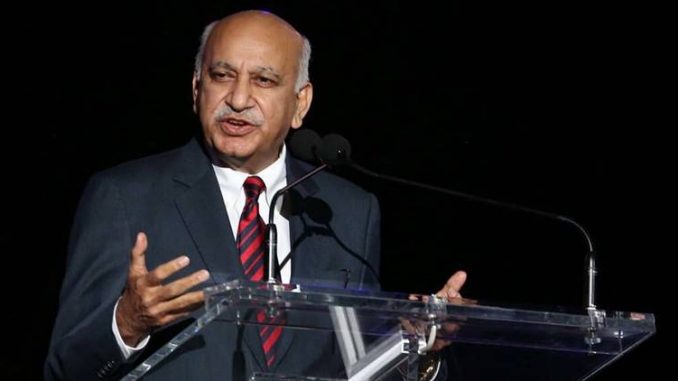
New Delhi : Union Minister M J Akbar on Monday said South Asia was a “sea of faiths, opinions, voices” and the people had to ensure they lived by “faith equality”, and not “faith supremacy”. At the convocation ceremony of the South Asian University (SAU) in New Delhi, the minister said the individuals had to find their own way to faith.
“It is not for us to judge whose way is better or whose way is worse,” the minister of state for external affairs said. Akbar, who was the chief guest at the convocation, said freedom, faith and equality were the pillars of modernity.
“Modernity must have freedom. Many countries got freedom from the British, but they forgot to transfer it to their own people. Freedom is not the one exercised by governments. That is a small part. Freedom is the one exercised by individuals,” the BJP leader said. Holding that no nation could be called modern unless it ensured gender equality, he said modernity was also determined by the social and economic empowerment of women.
Reaffirming India’s commitment towards regional education, the minister said New Delhi was fully committed to building a permanent campus for the university, and would bear its full cost of Rs 2500 crore. The varsity currently operates from Akbar Bhawan. “This university has succeeded in translating a vision into a reality in a short span. It has already produced about 900 scholars,” he said.
Applications for admission to SAU — primarily for the member-nations of the South Asian Association for Regional Cooperation (SAARC) — witnessed a rise this year, reflecting its popularity among students of the region, he said. For this academic year, the varsity received 7188 applications for 238 seats. Most applicants –5875 — were from India, followed by Afghanistan (854), Bangladesh (236) and Nepal (104).
Eight-six applications were received from Pakistan, 30 from Bhutan, 22 from Sri Lanka and five from Maldives. “The number of applications for SAU programmes jumped considerably in 2017-18 as compared to previous academic years,” Akbar said at the convocation, presided over by Deep Kumar Upadhyay, Nepal’s ambassador to India.
A total of 185 students were conferred their Masters and MPhil Degrees in various programmes. Eleven programme toppers were honoured with the SAU Gold Medal. Out of the year’s graduates, 21 are from Afghanistan, 28 from Bangladesh, one from Bhutan, one from Maldives, 16 from Nepal, 11 from Pakistan and three from Sri Lanka. The remaining 104 are from India.
Nine students got their MPhil Degrees – one each from Sri Lanka and Afghanistan and seven from India. The SAU commenced its academic operations in 2010. It reserves seats for each member nation. Not more than 50 per cent of students can be from India, while Pakistan and Bangladesh have 10 per cent of the total seats each.
The remaining countries — Afghanistan, Maldives, Bhutan, Sri Lanka and Nepal — have four per cent reservation each. Ten per cent seats are reserved for international students from countries outside the SAARC. This year, tests were conducted for Masters and PhD programmes in Applies Mathematics, Biotechnology, Computer Science, Economics, Legal Studies, International Relations and Sociology.
Urging students to work for the development of South Asia, Ambassador Upadhyay said it was their responsibility to strive for the prosperity of the region. Technology should be used to improve life in South Asia, where poverty was an “extreme challenge”, Upadhyay said. “But South Asia is not all about poverty and backwardness. It is also about potential, determination and wisdom,” he said.
Source: The Indian Express

Leave a Reply